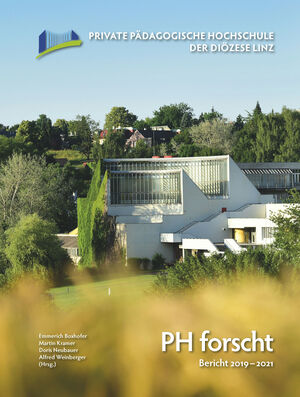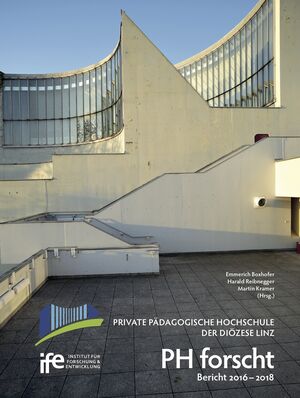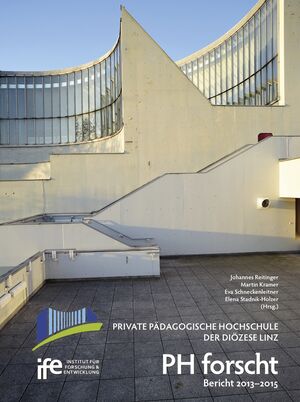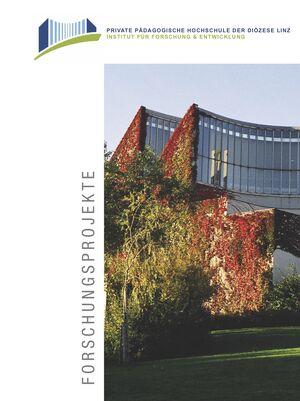"PH forscht" – Research reports of the PHDL
Overview of research activities published as triennial reports.
PH forscht. Research Report 2019–2021

Boxhofer, E., Kramer, M., Neubauer, D. & Weinberger, A. (Hrsg.). (2022).
PH forscht. Bericht 2019–2021. Linz: PHDL.
At first glance, the research mandate given to the universities of teacher education by the BMBWF is clear and well comprehensible. With reference to F. Lyotard I take the liberty of a short critical replication on the term "scientific knowledge". According to Lyotard, in the course of the 20th century there has been a loss of credibility of the "grand narratives" for the legitimation of knowledge. As a result, the notion of a unified body of knowledge, to which scientific knowledge in its most diverse manifestations would each contribute, also disappeared. Rather, according to Lyotard, postmodernism would be characterized by a multiplicity of different forms of knowledge and modes of discourse that are in conflict with each other. With regard to educational research at teacher training colleges and the task of "transforming scientific knowledge into practical knowledge for action", Lyotard's ideas lead to important conclusions for me. It is necessary to consider exactly that "gap" which stands between "scientific knowledge" and the transfer into "practical knowledge for action". If educational research recognizes the conflict of forms of knowledge as such, this also implicitly means that the respective own limitations are acknowledged and that a claim to sole representation is renounced. The basic mission of educational research could then be seen, this following H.C. Koller, precisely in "creating an awareness of the limits of its different forms of knowledge and modes of discourse."
(From the preface by Rector Franz Keplinger)
PH forscht. Research Report 2016–2018

Boxhofer, E., Reibnegger, H., & Kramer, M. (Hrsg.). (2019). PH forscht. Bericht 2016–2018. Linz: PHDL.
The basis and foundation of all higher education and university institutions is the freedom of research and teaching. This sounds almost trivial, yet at present it is anything but self-evident. Less than two years ago, hundreds of thousands of people in more than 500 cities around the world took to the streets in the "march for science" to send a signal for science, for the freedom of science and research. "Science, not silence" was the guiding motto. Science and research, according to the tenor of the events, are the supporting pillars of the democratic system. The political scientist Anton Pelinka, alluding to the political situation in Hungary and the USA, put it in a nutshell: If the freedom of science is endangered, the freedom of democracy is endangered. In this context, I also recall the statements of the psychologist Klaus Holzkamp, who once said that science is a never-ending process of gaining human knowledge. As a constant struggle against narrow-mindedness, superficiality and illusory knowledge, it is a permanent questioning of the seemingly self-evident.
(From the preface by Rector Franz Keplinger)
PH forscht. Research Report 2013–2015

Reitinger, J., Kramer, M., Schneckenleitner, E., & Stadnik-Holzer, E. (Hrsg.). (2015). PH forscht. Bericht 2013–2015. Linz: PHDL.
"We teach what we research and we research what we teach!" This motto of the Faculty of Education at the University of Helsinki, which I had the opportunity to visit in spring 2014, also represents my vision for our university. In the next 5 to 10 years, the framework should be expanded so that research can be a topic for all colleagues. Numerous publications, dissertation and post-doctoral projects provide further eloquent testimony to the fact that a research-oriented institutional climate has been further developed at our university in recent years. And this in a framework and with research resources that are still far from ideal. When we talk about the importance of the four pillars - subject-specific science, subject-specific didactics, educational science and pedagogical-practical studies - especially in the conception of pedagogical education, we always do so against the background that research should be a topic in all areas - in different forms: from reflection on one's own practice to research-led teaching to participation in the national and international discourse on educational research. Prof. Prenzel from the School of Education at the Technical University of Munich is convinced that, from an overarching perspective, it is not just a matter of receiving and interpreting knowledge from research, but of entering into a dialogue with research and contributing to it oneself. However, research, especially educational research, is not an end in itself. Research should always serve the project of "cultivating humanity," as M. Nußbaum impressively describes in her book of the same name. The ability to think critically - probably the basic attitude of all research - is therefore of utmost importance in order to be able to lead an examined life - following Socrates, Nußbaum formulates "An unexamined life is not worth to be lived!"
(From the preface by Rector Franz Keplinger)
Research Projects 2012

Research projects at the Private University College of Education of the Diocese of Linz
The Institute for Research and Development at the Private University College of Education of the Diocese of Linz has been in existence since 2007. Within the last few years, work has been done on integrating research as an integrative module in the entire training, further education and continuing education on the one hand, and on initiating and carrying out research projects by setting thematic focal points and integrating them into the scientific discourse on the other. The latter is documented by publications and participation in national and international conferences. Research is anchored in the Higher Education Act, but implementation in terms of defined resource allocations still poses difficulties in some cases. While on the one hand there are committed efforts to promote research at universities of education and we want to support them, we see a long-term effective potential for positioning research at universities of education in the pragmatic orientation towards a participation of own research activities in the international scientific discourse. In connection with this, we also see the chance to avoid presuppositions and institution-related attributions related to the genesis of teacher education and to concentrate on the actual research work. The individual main topics will be dealt with and researched through different research projects. On the one hand, in order to give room to critical questions, and on the other hand, in order to integrate research work at the university of teacher education, there is an "Interdisciplinary Discourse" at the private university of teacher education, which addresses all interested parties in order to become a stimulating platform for professional development in teacher education. We combine with our work the objective that - focused on concrete issues - the contributions describe perspectives for educational development that have an invigorating dimension for actors in practice and in theory. (Excerpt from the preface)

